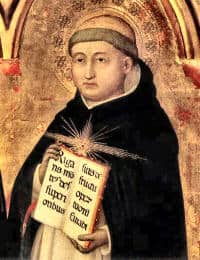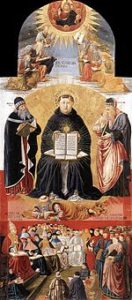Sermon for the Feast of St Thomas Aquinas
29 January 2017
1.
Yesterday was the feast of St Thomas Aquinas, a happy day for the Church — or for me at least. I developed something of an unlikely interest in St Thomas’ major work, the Summa Theologiae, when I was about 24.
It was intended as an introductory work for thirteenth century university students, but by contemporary standards it is very hard going. Thomas writes in a terse, scholastic style; it is often a thicket of detail.
He was a Dominican, an order newly founded in the thirteenth century as an intellectual order, whose motto was contemplare et aliis tradere—“to contemplate and to share the fruits of contemplation.” His task was to show the inner rationality of the Christian faith and, especially, how it could meet new intellectual challenges—the discovery of the lost works of Aristotle after many centuries, and the challenge of Islam, which was entrenched in southern Spain.
My own devotion to Thomas’ work hasn’t wavered in all these years. I feel so much of my journey, actually, has been getting beneath Thomas’ forbidding style and discovering his human heart. I thought I would present to you, as simply as I can, the fruits of my own meditation on St Thomas.
2.
Humans are, says Thomas, wayfarers, beings on the way to God. We are on the way of ascent to God. Sometimes it is narrow, sometimes it is steep and winding. And this is the way of caritas—the way of love, or as Thomas says just as often, the way of friendship.
So much of his whole vision, I feel, can be seen imaginatively, with the eye of the mind. Imagine you are climbing a great mountain: you might gain a higher foothold; you might slip. The secret of moving higher is not to focus on ourselves, for then we become stuck or nervous or self-absorbed, and we make unwise choices. We fall into sin, and go hurtling down and down. No, we must look upwards towards the sun, if we can bear the vision of it through our squinting eyes. As we become more and more used to this light, we can look upon it more easily. We must try to forget ourselves and our frailty, becoming accustomed to the light from which we draw all our resource. Somehow, seemingly by a life and power beyond ourselves, we make it to the next foothold. And this sun is God. It is an image Thomas often used for God, who energises all things and brings them growth.
 When we forget ourselves and look around, we see the whole cliff face, illuminated by sunlight, with its many climbers. They offer us their help; they warn of dangerous footfalls, the stones that are loose and that spin away to the earth. And we ourselves offer what help we can to those below us. We throw out some ropes; we lend a hand. We teach any new techniques we might discover.
When we forget ourselves and look around, we see the whole cliff face, illuminated by sunlight, with its many climbers. They offer us their help; they warn of dangerous footfalls, the stones that are loose and that spin away to the earth. And we ourselves offer what help we can to those below us. We throw out some ropes; we lend a hand. We teach any new techniques we might discover.
The higher we climb, strangely, the more helpful the climbers around us seem to be: they are adepts. They have become good climbers, and most cooperative. They have learnt that climbing is as much about goodwill and sharing as it is about being quick with the rope and the hammer pins, or pitons as I think they’re called. They have become virtuous, having learnt charity, and with it, as Thomas would say, wisdom. It is not like it was at the beginning, when all those brash and competitive climbers tried to outdo one another, some of them even jumping on the backs of others: they didn’t make it.
Distantly we can see some who have made it to the top. These are related to everyone below, bestowing their friendship and wisdom on all. They are skilled at cooperating one with another: they seem to be even a single person—going out of themselves ecstatically (ecstasis). Each dwells in the heart of the other (mutua inhaesio). They are a communion, holding all things in common (communicatio, koinonia). These fully enlightened ones are the saints, and they of all people are happy. In their midst is the Christ, who shines with the full lustre of the sun. His life is fully communicable to all; he is friend to all. This is he who said, in John’s Gospel, I no longer call you servants, but friends.
3.
So there you have Thomas’ vision of the Christian way—the way of charity, the way of friendship. It is the way of self-forgetfulness and cooperation with others, which brings with it wisdom. And this is the goal of life. Love, or friendship, and wisdom are the highest goods–and not riches, or honours, or food or sex for their own sake.
Yet it was a vision not well understood even by Thomas’ contemporaries. And, as we know, the Christian way was constantly overshadowed, even lost. In the time of Martin Luther, some were suggesting that, after all, we could buy our way to the top. Some imposed harsh disciplines which did not make us better people, but only made us more fearful and selfish. Drawing no strength from the sun above, we became utterly exhausted. We forgot that the point of the climb was to grow in love.
Some of the reformers tried to abolish the mountain altogether. None were higher or lower, it seemed. If we had trust in God, we were already saints—all of us who are in Christ, and not just some on the mountain top. All ideas of a progressive ascent or rising up were done away with, including the idea of a continual purification after death. For a while, this gave a great sense of release, a great sense of freedom and equality. The playing field was level.
But as the first enthusiasm died down, the way of salvation still seemed unsure: was there really nothing to strive for? Was there no Way?
And, sadly, there came new prophets, proclaiming a way of selfish and competitive struggle—for money and for power. The vision of the Light who bestows love and wisdom was eclipsed. The dark clouds loomed thickly over the mountain, and few there were who rose above the foothills. Think, for instance, of the contemporary crisis of friendship—of sharing, neighbourliness and community life.
So may we allow Thomas to be our teacher again. May we open ourselves to the mysterious Light shining within us, however dim and small the flame might have become, and so open up to other people in friendship.
Amen.


